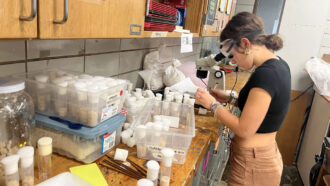
Tech
A man silenced by paralysis got his ‘voice’ back, thanks to AI
New computer-linked brain implants offer hope to those who have lost the ability to speak or move.
Come explore with us!

New computer-linked brain implants offer hope to those who have lost the ability to speak or move.

The idea that we use different sides of the brains to be creative or logical is popular — but it’s not supported by science. Here’s why.

Neuroarts, a new field of science, is finding that exposure to arts can improve learning, behavior and mental health.

Electricity powers key functions in the brain, heart and bone. Scientists are working to understand those currents to improve our health and moods.

The active chemical in marijuana might have some medicinal value. But studies point to THC's potential risks, especially for teens.

Studies of the brainy birds’ abilities to use tools, solve puzzles, speak words and more may teach us about how our species got our smarts.

A debate rages over how to count brain cells in dinosaurs. At issue: figuring out how these extinct animals’ likely behaved.

Forcing fruit flies to move shows how the insects coordinate their steps. This holds clues to other animals’ brains and movement.

A finalist at Regeneron ISEF found that a plant native to China could supplement a common pain reliever that comes with unwanted side effects.

Science reveals the many reasons we are so distracted, from poor sleep and social media to diet and exercise. It also shows us how to take back our focus.